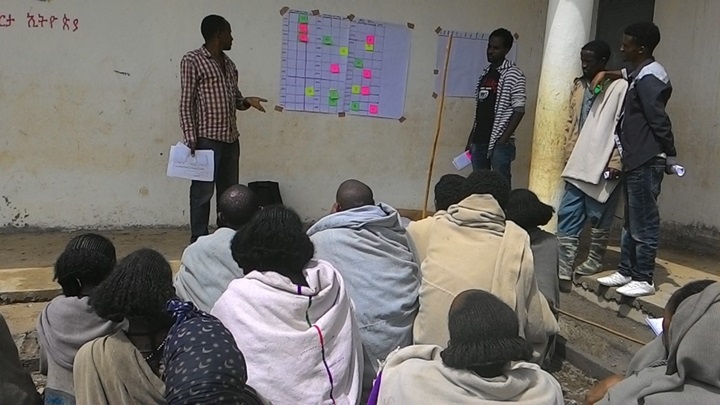Interview with Research Fellow Solomon Haddis Teklehaymanot: Exploring the Impacts of Conflict on Children and Land Tenure Security’s Role in Structural Transformation
2025.04.18
What impact does conflict have on children? Is there a relationship between land tenure security and structural transformation? Solomon Haddis Teklehaymanot, research fellow at the JICA Ogata Sadako Research Institute for Peace and Development (JICA Ogata Research Institute), recently launched research projects to answer these critical questions. We sat down with him to discuss his work.

—You obtained your degrees in Japan. What led you to study in Japan?
When I was a high school student, I read a book written by Ethiopian scholar Kebede Michael entitled "How Did Japan Become Civilized?" which explores Japan’s rapid modernization, suggesting that Ethiopia could learn from Japan’s economic strategies to achieve its own economic development. My encounter with this book sparked my desire to study in Japan.
After serving as planning and research expert at a government bureau, as head of the department of economics, as business enterprise managing officer and as a lecturer at Aksum and Mekelle University in Ethiopia from 2008 to 2014, I received a scholarship from the Ministry of Education, Culture, Sports, Science and Technology (MEXT) of Japan to study at the National Graduate Institute for Policy Studies (GRIPS) from 2016 to 2021. Japan has a good reputation in development economics and public policy research, and GRIPS was particularly well known in this field. There, I earned my master’s degree in public economics and my doctoral degree in development economics.
At the JICA Ogata Research Institute, I am leading two studies. One is titled “Impact of Conflict and Drought on Child Well-being and Educational Outcomes in Tigray, Ethiopia
,” and the other is titled “The Role of Land Tenure Security in Facilitating the Process of Structural Transformation
.” The land tenure security project builds on my previous work before coming to Japan, making it a perfect match for my professional background.
—Could you tell us about your research on the impact of conflict on children? What motivated you to study this topic?
My interest in this topic is deeply personal, as I have experienced the effects of conflict firsthand. I am from Tigray in Ethiopia. During the conflict, I was in Japan pursuing my degrees, unable to communicate with family and colleagues in Ethiopia due to the destruction of landlines and internet access. This project was initiated in response to the devastating impact of conflict and recurrent droughts in Tigray on children’s education and well-being. The war in Tigray, which began in November 2020 and ended with the cessation of hostilities in November 2022, severely impacted human security. Human rights abuses and sexual violence left deep scars, while all children were out of school for two years and academic centers suffered looting and extensive damage. Livelihoods were significantly disrupted, if not entirely eroded. Following the war, a crippling drought further devastated many districts. These overlapping shocks have long-lasting effects, particularly on children’s education and the overall well-being of the people.
Children in Tigray were deprived of learning opportunities due to the conflict, exacerbating an already challenging educational environment. This photo was taken in 2017 before the conflict. (Photo: JICA)
In the project “Impact of Conflict and Drought on Child Well-being and Educational Outcomes in Tigray, Ethiopia ,” we will analyze how the conflict and subsequent drought have affected children’s well-being and education, using data from household surveys that examine academic performance and the coping mechanisms adopted by affected households during and after these severe shocks.
The survey was originally scheduled for last November but had to be postponed because of security concerns. Once completed, the study’s findings will be published as a journal paper to provide insights for academics, policymakers and development cooperation actors, including JICA, in designing effective programs to improve child well-being, education and other post-war recovery efforts in Tigray.
Conflicts and severe weather events, including droughts, are global challenges. With climate change making extreme weather events more frequent, multiple shocks are likely to occur simultaneously in different parts of the world. I hope the findings of this study will not only support Tigray’s recovery but also offer valuable insights for other regions facing similar crises.
—You’ve also launched a project on land tenure security and structural transformation. What sparked your interest in this topic?
In Ethiopia, all land is government-owned, and historically, land has often been redistributed, creating a sense of tenure insecurity. Growing up in Ethiopia, I saw how farming households struggled to make long-term investments in their land to increase farm productivity and then reduce poverty, partly due to the lack of a clear land tenure system. Insecure tenure also made farming households very vulnerable to land disputes.
To improve land tenure security through issuance of land certificates for all farmers in rural areas, the Ethiopian government launched a large-scale, low-cost land certification program in the Tigray region in 1998. This program is now using modern technology to improve the accuracy of land titles. Farmers benefit greatly from the program, and are also entitled to compensation if the government reclaims their land. Watching the changes that came with this program led to my interest in agricultural policy and programs.
—Could you elaborate on your research project?
In “The Role of Land Tenure Security in Facilitating the Process of Structural Transformation ,” I will focus on whether Ethiopia’s land certification program that enhances land tenure security increases the likelihood of farm household members taking up non-agricultural jobs. I will examine how the program affects the allocation of labor between agricultural and non-agricultural activities, as well as its impact on internal and international migration. Additionally, I will explore the differences between land certificates issued solely to household heads (typically men) and those issued jointly (to household head and spouse).

Ethiopian farmers discuss planting strategies during droughts, drawing on their village’s past experiences. (Photo: Solomon Haddis Teklehaymanot)
Agriculture is the dominant economic activity in East Africa, with about 70 percent of the population dependent mainly on it for their livelihoods. However, rural households face severe credit, insurance and land market failures, limiting economic opportunities. Hence, transforming agriculture into a market-driven, technology-intensive sector requires secure land tenure, making land certification a key policy tool for rural development. This research aims to determine whether land tenure security can contribute to structural transformation by enabling labor shifts to non-agricultural sectors while simultaneously promoting investment in land productivity.
My hypothesis is that the households with secure land tenure are more likely to invest in their land, adopt new technologies and enhance productivity. These investments could not only strengthen resilience against extreme weather events but also reduce their agricultural workload and create opportunities for additional income from non-agricultural jobs. Furthermore, a land certificate could serve as collateral, allowing families to secure loans for off-farm activities or other economic ventures.
I’m also interested in the gender dynamics of land certification. In some areas, land certificates include both the household head’s and spouse’s names, while in others, only the household head’s name appears. I hypothesize that women who contribute labor to their land but are excluded from certification may feel less ownership over their property. Conversely, households where both spouses are listed may experience stronger land ownership perceptions. I want to investigate whether these variations affect economic behavior and decision-making.
In Ethiopia, women often have less power to make decisions in their daily activities, including farm activities. Typically, household heads determine labor allocation and consumption choices. Little research exists on the impact of gender-inclusive land certification, but I suspect that empowering women through land ownership could boost their economic participation and overall productivity. Given the male-dominated nature of Ethiopian society, this study will provide valuable insight into gender equality in land ownership.
For this study, I will primarily use secondary data from the World Bank. I hope the findings will help the Ethiopian government assess the effectiveness of its land tenure program.
I hope this research will not only inform policy decisions but also lead to meaningful solutions, helping communities recover and thrive while promoting modernization in developing nations.

事業事前評価表(地球規模課題対応国際科学技術協力(SATREPS)).国際協力機構 地球環境部 . 防災第一チーム. 1.案件名.国 名: フィリピン共和国.

事業事前評価表(地球規模課題対応国際科学技術協力(SATREPS)).国際協力機構 地球環境部 . 防災第一チーム. 1.案件名.国 名: フィリピン共和国.

事業事前評価表(地球規模課題対応国際科学技術協力(SATREPS)).国際協力機構 地球環境部 . 防災第一チーム. 1.案件名.国 名: フィリピン共和国.

事業事前評価表(地球規模課題対応国際科学技術協力(SATREPS)).国際協力機構 地球環境部 . 防災第一チーム. 1.案件名.国 名: フィリピン共和国.

事業事前評価表(地球規模課題対応国際科学技術協力(SATREPS)).国際協力機構 地球環境部 . 防災第一チーム. 1.案件名.国 名: フィリピン共和国.
scroll